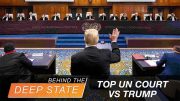
A long-anticipated preliminary report on former Wisconsin Supreme Court Justice Michael Gableman’s investigation into issues with the state’s 2020 general election was released on Tuesday, and Gableman spoke at the State Capitol in Madison.
The report cited several concerns with the Badger State’s election procedures during the 2020 election, then offered suggestions of ways to tighten the system going forward and even recommended that the state look into decertifying the results of the 2020 election. In Wisconsin, Joe Biden defeated former President Donald Trump by approximately 21,000 votes, and Wisconsin’s 10 electoral votes helped push Biden over the 270 needed to give him the presidency.
“The Legislature ought to take a very hard look at the option of decertification of the 2020 Wisconsin presidential election,” Gableman said.
He also said the investigation remains incomplete due to several roadblocks placed in the way by state and local officials who are reluctant to either testify or share subpoenaed records with investigators.
The report added that public confidence in our elections has severely declined, largely due to obfuscation of the election process.
“This shaken faith is not a result of legitimate legislative inquiries into election administration, nor is it a result of lawful contests lodged by any candidate or party. Rather, it is largely a function of opaque, confusing, and often botched election processes that could have been corrected, and still can be corrected, with concerted effort on the part of lawmakers and conscientious civil servants who work for Wisconsin State government,” Gableman wrote.
He noted serious gaps in election security that might have allowed people to tamper with election results, and stated that it was ultimately up to the government to find out exactly what occurred and to prevent problems in the future.
“Accordingly, at this stage, the recommendations included in this Report largely fall within the umbrella of enabling oversight and transparency of our election systems. It draws no conclusions about specific, unauthorized outside interference or insider threats to machine voting, but it does provide numerous examples of security gaps that tend to enable bad actors to operate in the shadows. Absent access to these systems, it would not be unfair for any citizens to conclude the worst, however. It is a commonplace in the law for it to assume the worst about the nature and impact of hidden or destroyed evidence, and it is up to government to justify its actions to the people, not the other way around,” Gableman stated.
Among the irregularities reported was Mark Zuckerberg’s Center for Tech and Civic Life’s (CTCL) $8.8 million in grants, primarily to Wisconsin’s largest cities of Milwaukee, Madison, Green Bay, Racine, and Kenosha. Gableman described the Zuckerberg grants as “prohibited election bribery,” citing a Wisconsin law that prohibits cities from receiving money to get voters to the polls or to facilitate electors voting by absentee ballot.
“The Zuckerberg-funded CTCL/Zuckerberg 5 scheme would prove to be an effective way to accomplish the partisan effort to ‘turnout’ their desired voters and it was done with the active support of the very people and the governmental institution [the Wisconsin Elections Commission] that were supposed to be guarding the Wisconsin elections administrative process from the partisan activities they facilitated,” the report stated.
Exactly how those funds were distributed and used is one of the things Gableman is seeking answers to. Two weeks ago, the investigator filed a petition in Waukesha County Circuit Court that would compel Mayor Satya Rhodes-Conway of Madison and Mayor Eric Genrich of Green Bay, as well as a smattering of election officials in other jurisdictions, to be deposed or be subject to arrest.
Criticism of Gableman’s report was both ample and scathing. Democratic Wisconsin Governor Tony Evers said in a statement: “This circus has long surpassed being a mere embarrassment for our state. From the beginning, it has never been a serious or functioning effort, it has lacked public accountability and transparency, and it has been a colossal waste of taxpayer dollars.”
Wisconsin Attorney General Josh Kaul, also a Democrat, called the report “a full-throated attack on our democracy and a truly shocking example of the authoritarian mindset at work.”
Even some in the GOP bashed Gableman. Jim Steineke, the majority leader in the State Assembly, promised in a Twitter thread to do everything he can to halt Gableman’s efforts: “I can guarantee that I will not be part of any effort, and will do everything possible to stop any effort, to put politicians in charge of deciding who wins or loses elections,” Steineke wrote.
Nevertheless, Gableman vows to soldier on with his efforts: “The work of the Office of the Special Counsel is just getting started. The Office will remain authorized during the pendency of litigation to ensure that once the Wisconsin Supreme Court vindicates the right of the people to know what their own government is up to, we can expeditiously run necessary tests.”



